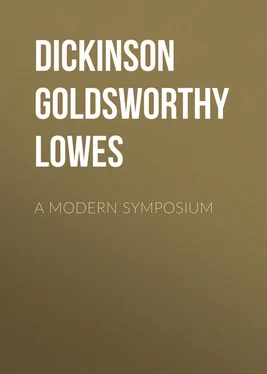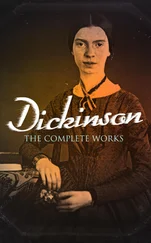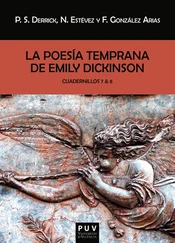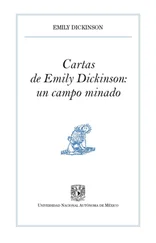Goldsworthy Dickinson - A Modern Symposium
Здесь есть возможность читать онлайн «Goldsworthy Dickinson - A Modern Symposium» — ознакомительный отрывок электронной книги совершенно бесплатно, а после прочтения отрывка купить полную версию. В некоторых случаях можно слушать аудио, скачать через торрент в формате fb2 и присутствует краткое содержание. Жанр: foreign_antique, foreign_prose, на английском языке. Описание произведения, (предисловие) а так же отзывы посетителей доступны на портале библиотеки ЛибКат.
- Название:A Modern Symposium
- Автор:
- Жанр:
- Год:неизвестен
- ISBN:нет данных
- Рейтинг книги:5 / 5. Голосов: 1
-
Избранное:Добавить в избранное
- Отзывы:
-
Ваша оценка:
- 100
- 1
- 2
- 3
- 4
- 5
A Modern Symposium: краткое содержание, описание и аннотация
Предлагаем к чтению аннотацию, описание, краткое содержание или предисловие (зависит от того, что написал сам автор книги «A Modern Symposium»). Если вы не нашли необходимую информацию о книге — напишите в комментариях, мы постараемся отыскать её.
A Modern Symposium — читать онлайн ознакомительный отрывок
Ниже представлен текст книги, разбитый по страницам. Система сохранения места последней прочитанной страницы, позволяет с удобством читать онлайн бесплатно книгу «A Modern Symposium», без необходимости каждый раз заново искать на чём Вы остановились. Поставьте закладку, и сможете в любой момент перейти на страницу, на которой закончили чтение.
Интервал:
Закладка:
"But what has been done is final and irremediable. Henceforth, numbers, or rather those who control numbers, will dominate England; and they will not be the men under whom hitherto she has grown great. For people like myself there is no longer a place in politics. And really, so far as I am personally concerned, I am rather glad to know it. Those who have got us into the mess must get us out of it. Probably they will do so, in their own way; but they will make, in the process, a very different England from the one I have known and understood and loved. We shall have a population of city people, better fed and housed, I hope, than they are now, clever and quick and smart, living entirely by their heads, ready to turn out in a moment for use everything they know, but knowing really very little, and not knowing it very well. There will be fewer of the kind of people in whom I take pleasure, whom I like to regard as peculiarly English, and who are the products of the countryside; fellows who grow like vegetables, and, without knowing how, put on sense as they put on flesh by an unconscious process of assimilation; who will stand for an hour at a time watching a horse or a pig, with stolid moon-faces as motionless as a pond; the sort of men that visitors from town imagine to be stupid because they take five minutes to answer a question, and then probably answer by asking another; but who have stored up in them a wealth of experience far too extensive and complicated for them ever to have taken account of it. They live by their instincts not their brains; but their instincts are the slow deposit of long years of practical dealings with nature. That is the kind of man I like. And I like to live among them in the way I do – in a traditional relation which it never occurs to them to resent, any more than it does to me to abuse it. That sort of relation you can't create; it has to grow, and to be handed down from father to son. The new men who come on to the land never manage to establish it. They bring with them the isolation which is the product of cities. They have no idea of any tie except that of wages; the notion of neighbourliness they do not understand. And that reminds me of a curious thing. People go to town for society; but I have always found that there is no real society except in the country. We may be stupid there, but we belong to a scheme of things which embodies the wisdom of generations. We meet not in drawing-rooms, but in the hunting-field, on the county-bench, at dinners of tenants or farmers' associations. Our private business is intermixed with our public. Our occupation does not involve competition; and the daily performance of its duties we feel to be itself a kind of national service. That is an order of things which I understand and admire, as my fathers understood and admired it before me. And that is why I am a Tory; not because of any opinions I hold, but because that is my character. I stood for Toryism while it meant something; and now that it means nothing, though I stand for it no longer, still I can't help being it. The England that is will last my time; the England that is to be does not interest me; and it is as well that I should have nothing to do with directing it.
"I don't know whether that is a sufficient account of the question I was told to answer; but it's the best I can make, and I think it ought to be sufficient. I always imagine myself saying to God, if He asks me to give an account of myself: 'Here I am, as you made me. You can take me or leave me. If I had to live again I would live just so. And if you want me to live differently, you must make me different.' I have championed a losing cause, and I am sorry it has lost. But I do not break my heart about it. I can still live for the rest of my days the life I respect and enjoy. And I am content to leave the nation in the hands of Remenham, who, as I see, is all impatience to reply to my heresies."
REMENHAM in fact was fidgeting in his chair as though he found it hard to keep his seat; and I should have felt bound in pity to call upon him next, even if I had not already determined to do so. He rose with alacrity; and it was impossible not to be struck by the contrast he presented to Cantilupe. His elastic upright figure, his firm chin, the exuberance of his gestures, the clear ring of his voice, expressed admirably the intellectual and nervous force which he possessed in a higher degree than any man I have ever come across. He began without hesitation, and spoke throughout with the trained and facile eloquence of which he was master. "I shall, I am sure, be believed," he said, "when I emphatically assert that nothing could be more distressing to me than the notion – if I should be driven to accept it – that the liberal measures on which, in my opinion, the prosperity and the true welfare of the country depends should have, as one of their incidental concomitants, the withdrawal from public life of such men as our friend who has just sat down. We need all the intellectual and moral resources of the country; and among them I count as not the least valuable and fruitful the stock of our ancient country gentlemen. I regretted the retirement of Lord Cantilupe on public as well as on personal grounds; and my regret is only tempered, not altogether removed, when I see how well, how honourably and how happily he is employing his well-deserved leisure. But I am glad to know that we have still, and to believe that we shall continue to have, in the great Council of the nation, men of his distinguished type and tradition to form one, and that not the least important, of the balances and counter-checks in the great and complicated engine of state.
Читать дальшеИнтервал:
Закладка:
Похожие книги на «A Modern Symposium»
Представляем Вашему вниманию похожие книги на «A Modern Symposium» списком для выбора. Мы отобрали схожую по названию и смыслу литературу в надежде предоставить читателям больше вариантов отыскать новые, интересные, ещё непрочитанные произведения.
Обсуждение, отзывы о книге «A Modern Symposium» и просто собственные мнения читателей. Оставьте ваши комментарии, напишите, что Вы думаете о произведении, его смысле или главных героях. Укажите что конкретно понравилось, а что нет, и почему Вы так считаете.












